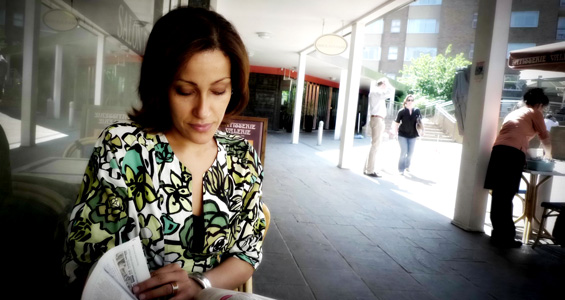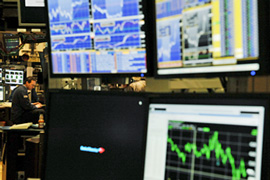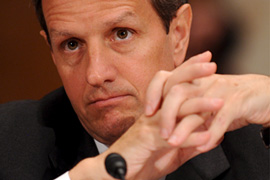Why America is a bank-owned
state
(USA.
June 14, 2009 Ceegaag Online)

Development
projects often fail if they go against the existing power
structure in a village or region
In my last column I introduced the idea that America's
handling of the financial crisis, and in particular the way
it has refused to deal with the banks, is more in keeping
with how an "emerging" economy might behave and act.
So this week, I will say that America has become a
bank-owned state, allowing its banking oligarchs to
suffocate the economy so they can survive at any price.
As a development economist, what always made developing
and poorer countries stand out was the level of inequality
between individuals.
That is, the difference between how a small percentage,
usually the country's capitalists, oligarchs and those close
to people in power, were overdosing on wealth as the rest
struggled to make ends meet, or even survive.
Everyone in the country knew it, from the poorest farmer
on the street to the richest oligarch. It was in your face,
unashamed, unabated and highly discomforting.
Discomforting because it made all of us who witnessed it
feel crippled at the power of the status quo, ruing the
unfairness of life when merit always comes last, relative to
who you know and who you are.
We took some relief from believing that this only happens
because these countries were authoritarian, and not so
accountable to their electorate.
Yet, if we look closer at the leading capitalist
economies such as those of America and the UK, we will find
that inequity raises its ugly head equally, and as starkly,
when you look at the numbers.
Kept in the dark
Here too, a small percentage have the lion's share of
national income in their hands, while the rest of the
population experience stagnant incomes, all within a
democratic, rather than an authoritarian, political regime.
Yet the real difference here is that, away from the
numbers, the wider population and the electorate were mostly
kept in the dark about this.
In 2006, the top one per cent of American households'
share of all disposable income amounted to almost a quarter
of all households' disposable income, according to Robert
Hunter Wade, professor of political economy at the London
School of Economics.
 |
|
Signs that the crisis would become a great
recession were apparent for a long time [EPA] |
In crude terms, one per cent of the population have a
quarter of all the wealth.
Moreover, Wade found the average income of the bottom 90
per cent of the population remained almost stagnant after
1980, although consumption kept rising thanks to the
build-up of private debt.
This means that 90 per cent of the American economy were
financing their American dream on debt.
In the UK, Wade found the pay gap between the highest and
average earners had widened alarmingly.
Back in 1989, chief executives pocketed 17 times more
than average earners.
By 2007, those same "captains of industry" were earning
75 times more than the average worker.
That is one enormous leap and I wouldn't mind that
happening to my salary!
What's good for Wall Street ...
Warning signs that the financial crisis would become the
great recession were there for all to see for a long time.
But where were the alarms in the system itself to say
that these countries and the individuals in them were
pursuing an unsustainable way of life?
Where were the signs that things were going to end
disastrously and, worse still, that the most vulnerable
might end up paying the heftiest and most disproportionate
price than anyone else?
I believe the status quo was allowed to go unquestioned
because banks were benefiting obscenely from the interest on
our debt, and governments were in cahoots with these banks.
|
"... this warped and unjust way of operating was
not questioned because the electorate was kept in the
dark in the most subtle way possible" |
Let's not forget that governments conveniently moved away
from the provision of affordable healthcare, free university
education and affordable housing while the banks entered our
lives, aggressively, to fill that void.
In addition, I think that this warped and unjust way of
operating was not questioned because the electorate was kept
in the dark in the most subtle way possible.
The whole issue was made invisible. It was kept off the
radar screens of electoral politics.
The American electorate were made accomplice to this
because they were convinced that what was good for Wall
Street, was good for America as a whole.
It was a political sleight of hand of the highest order.
And this explains the bipartisan agreement to the
ill-designed deregulation of the finance sector that we have
seen over the years.
America has become a bank-owned state.
Ann Pettifor, a fellow development economist who works
for the New Economics Foundation, says the US administration
has been hijacked, and democracy has been pushed aside in
favour of what is good for the bankers, by what Abraham
Lincoln called "the money power".
And how right she is. The way the banks are being bailed
out is a clear example of this political edifice.
Sucking the life out of tax-payers
The fact some of these failing banks have been thrown a
lifeline is a testament to the hold they have over Barack
Obama's administration.
Some of the banks should be allowed to die because they
are so insolvent and holding so much in toxic assets that
they will forever need to be on taxpayer-funded life
support.
The problem is, this life support is sucking the life out
of the taxpayer in the process, as it weighs them down with
ever-increasing debt.
On top of that, the money could be used to restructure
the economy in a way that is less reliant on the financial
sector.
Underlying this refusal to kill those banks in poor
health is a faulty and, dare I say, convenient assumption,
that is not backed up by reality or fact, that the banks are
facing a liquidity crisis as opposed to them facing a
solvency crisis.
A liquidity crisis means the banks are facing a credit
shortage, and once that is sorted, all will be well.
 |
|
Geithner's 'stress tests' were meant to tell
which banks would not be able to survive [EPA] |
A solvency crisis means that the assets of many banks,
firms and households are worth less than their debt.
And this means that these banks have to be completely
nationalised.
Which leads us to Timothy Geithner, the US treasury
secretary, and his "stress tests".
The tests were meant to give a clear and final assessment
of these banks' balance sheets, telling us which were
healthy and which would not be able to survive and would
need more cash if the recession deepens.
As in any induced test, like the ones we undergo when we
have our hearts tested, the "stress tests" were meant to
simulate worse-case scenarios. Well, that was the promise at
least.
The hope was that some would be declared so bad, they
would have to go under once and for all.
Unfortunately, the tests turned out peculiarly lacking in
stress.
Nouriel Roubini, professor at the Stern School of
Business at New York University, says: "The government used
assumptions for the macro variables in 2009 and 2010 that
are so optimistic that the actual data for 2009 are already
worse than the adverse scenario.
"As for some crucial variables, such as the unemployment
rate – key to proper estimates of default and recovery rates
for residential mortages ... and other bank loans – the
current trend shows that by the end of 2009 the unemployment
rate will be higher than the average unemployment rate
assumed in the more adverse scenario for 2010, not for
2009."
The unemployment rate used in the worse-case scenario was
assumed to average 8.9 per cent in 2009 and 10.3 per cent in
2010. But unemployment has already reached 9.4 per cent this
year, and looks likely to overtake 10.3 per cent by next
year.
So, there is nothing really challenging about these worse
case scenarios at all.
Next week, I'll write about Timothy Geithner's plan to
wipe toxic assets off the banks' balance sheets without
getting rid of one single bank ... and how long before we
say ENOUGH and really do something about it.
The views expressed in this column are the
author's own and do not necessarily reflect Ceegaag Online
editorial policy.
Source:
Samah El-Shahat also
presents Al Jazeera's People & Power programme.
www.ceegaag.com

webmaster@ceegaag.com |

